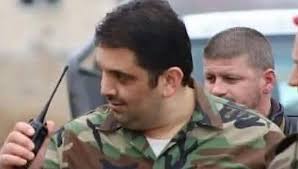A wave of public anger is mounting in Syria as the new transitional government strikes controversial settlements with figures linked to the former regime—individuals accused of committing egregious crimes during the war. The backlash reached a boiling point in recent days with the reappearance of Fadi Saqr, the former commander of the notorious National Defence Forces (NDF) militia in Damascus, who has been brokering settlements for former regime officers and militiamen without subjecting them to judicial accountability.
Fadi Saqr—once dubbed “The Falcon of the National Defence” by the Assad regime—was among the most prominent faces of the war’s brutal violence. He rose to notoriety in 2012 when he led an Iran-backed faction of the NDF in Damascus, before being promoted to lead the militia nationwide. Under his command, the NDF was accused of laying siege to opposition-held areas, particularly in southern Damascus, and was implicated in massacres, the destruction of civilian property, and systematic looting.
Despite being placed under U.S. sanctions in 2012 for grave human rights violations, Saqr remained under regime protection for years. Following the regime’s collapse in December, he reemerged as a figure within so-called “National Reconciliation Committees,” adopting conciliatory rhetoric and attempting to rehabilitate his image through public dialogue initiatives.
His most recent appearance alongside Damascus Governor Maher Marwan and Reconciliation Committee head Hassan Soufan at a condolence gathering organized by the “Council of Notables of Ash al-Warwar” sparked widespread anger—especially among families of victims and former detainees. Saqr remains formally accused in multiple legal filings of murder and torture committed in NDF-run detention centres.
The council, which publicly announced Saqr’s participation, referred to him in its official statement as a “lawyer”—a move that triggered further outrage. Local sources reported that the mourning ceremony was held for five citizens who had been abducted and killed in Damascus, with the perpetrators still unidentified.
Victims Forgotten, Perpetrators Honoured
The families of victims expressed deep frustration over the public rehabilitation of a figure still under accusation, describing the event as an “insult to the blood of the martyrs” and a signal that war criminals could enjoy impunity. They noted that the presence of official figures alongside Saqr was interpreted as tacit endorsement or even exoneration.
Human rights organisations, particularly the Syrian Network for Human Rights, have documented hundreds of cases of torture and extrajudicial execution in NDF detention facilities reportedly overseen by Saqr. Zaman al-Wasl, an independent Syrian newspaper, had previously published photos and names of hundreds of victims who died in the militia’s prisons.
Activists commonly refer to Saqr as the “Butcher of Syria,” a moniker tied to his alleged role in the 2013 Tadamon massacre, in which civilians were executed en masse. His recent return to that same neighbourhood following the regime’s fall has stirred painful memories and intense anger among residents still haunted by the horrors of that era.
Since the fall of Bashar al-Assad’s regime on 8 December 2024, Syrians—along with local and international human rights organisations—have called for comprehensive accountability for all individuals involved in war crimes and human rights violations. There have also been growing demands for clarity on the fate of thousands of detainees and forcibly disappeared persons, despite recent declarations about prison releases and the opening of detention centres.
This article was translated and edited by The Syrian Observer. The Syrian Observer has not verified the content of this story. Responsibility for the information and views set out in this article lies entirely with the author.


